Are your customers satisfied with your brand’s service? Success in the modern business world does not solely depend on high-quality products.
A 2024 Forbes research suggests that, even if they loved the product, 64% of consumers would abandon a company if they experienced dissatisfactory customer service.
Excellent customer service is essential for building customer loyalty and growing your business. Good marketing and customer retention depend on delivering value, and a bad customer service experience can significantly jeopardize both.
The modern-day consumer does not have the patience to be put on hold for lengthy periods, forwarded to several agents without getting a solution, or worse, ignored. These are common reasons that often drive them to competitors.
Here’s when good customer service can make a difference. In this article, we will explore the essentials of customer service, its significance, and how we can use different technologies, like automation, to create stronger value propositions for your brand.
What is Customer Service?
Customer service is the support you offer to customers throughout their journey with your brand. It begins the moment they contact your business and continues through purchase, inquiry, and after-sales support.
But, exceptional customer service goes beyond customer problem-solving. It is about ensuring that every engagement is pleasant, be it voice calls, emails, live chats, or social media platforms.
The goal is to act as a reliable partner, ensuring that every interaction leads to long-term customer satisfaction and loyalty. This proactive approach not only helps resolve queries but also builds meaningful relationships with your customers over time.
An excellent customer support culture is all about establishing trust, timely response, and, above all, making customers feel special. It can shape brand perception and influence purchasing decisions.
Customer service forms an essential part of any organization, whether answering queries, solving problems, or assisting customers.
Nowadays, several companies use customer support software to make their services faster and more effective. These tools also automate repetitive tasks to streamline operations.
Yet, the need for human touch remains strong. Well-trained representatives make customer interactions positive and ensure that each experience strengthens the customer-company bond.
What is the Importance of Customer Service?
Nothing spells like the real deal in determining business success as much as customer service does. According to the 2024 Forbes research, 85% of customers are likely to do business with companies that provide excellent customer service.
Great service builds loyalty, while subpar experiences often lead to customer churn. When customers feel attended to, they are more likely to stay with your brand. This helps minimize acquisition costs and boost repeat sales.
Customer service experience also helps differentiate your business from competitors who offer identical products. Businesses that invest in customer experience often outperform those that ignore it.
Service failure may damage your brand’s reputation, leading to negative reviews and lost business. Dissatisfied customers flock to leave bad reviews quickly, making it essential to prioritize quality service at every stage to create a positive brand image.
Businesses earn customer loyalty and reap high profits when they provide flawless customer service.
Key Benefits of Investing in Customer Service
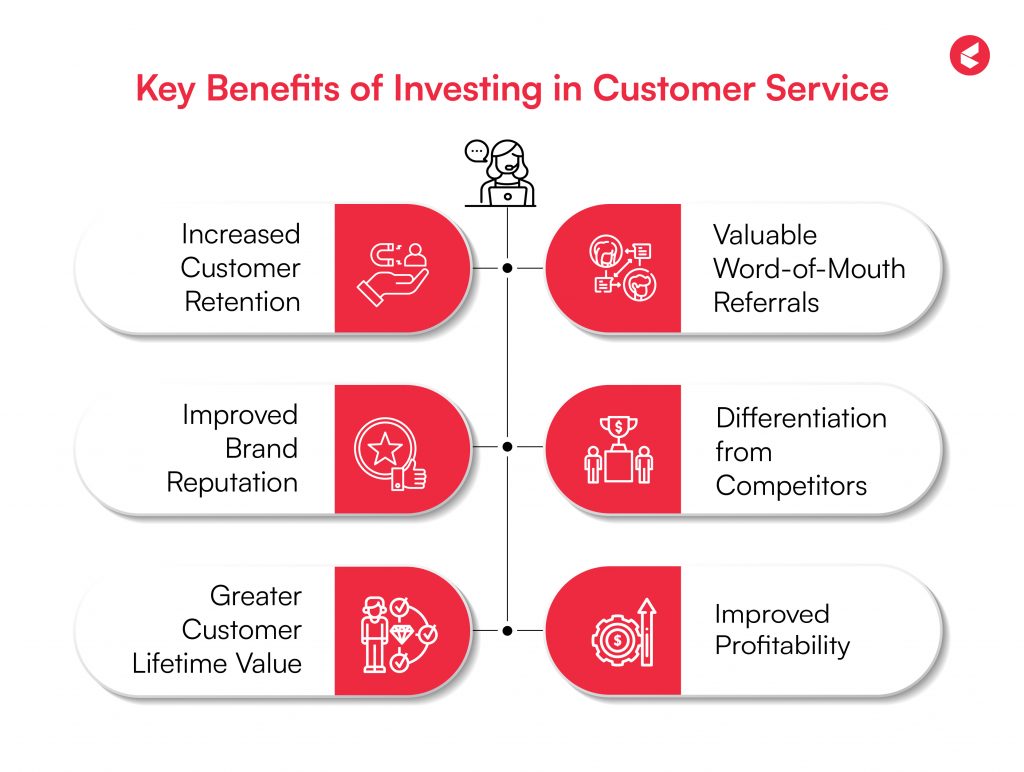
Customer service directly impacts customer satisfaction and overall business performance. Below are the key reasons why focusing on customer service is essential for business growth and success:
1. Increased Customer Retention
According to Calabrio, almost all consumers (97%) and contact center managers (98%) believe that customer service interactions have long-term impacts on brand loyalty.
Happy customers stay loyal when you address their concerns and meet their expectations. A strong customer service strategy reduces churn and builds lasting relationships that keep customers coming back for more.
2. Improved Brand Reputation
According to BrightLocal, 98% of individuals check online reviews for local businesses. Good customer service equals a reliable brand name.
Satisfied customers always spread the positive word, improving your credibility. This results in more referrals and enhanced public perception. Besides, it helps your business appear client-focused in the market.
3. Greater Customer Lifetime Value (CLTV)
Consumers who are treated well tend to buy more and remain loyal, boosting their lifetime value and translating into more revenue.
Emplifi’s 2022 Customer Experience report found that 61% of customers are willing to pay at least 5% more for a consistently great customer experience. A focus on customer satisfaction helps guarantee that your business receives the utmost value from each customer relationship.
4. Valuable Word-of-Mouth Referrals
Happy customers are highly likely to recommend your products to their friends or leave a good review on social media. Nielsen’s 2021 Global Trust in Advertising Study reported that 88% of consumers trust recommendations from people they know more than any other marketing form.
Positive word-of-mouth is a powerful marketing strategy for driving new customers and expanding brand reach. It also builds trust in your products or services organically.
5. Differentiation from Competitors
Recent Calabrio research reveals that 60% of customers switched brands due bad contact center service. In a crowded market, superior customer service experience distinguishes your business.
Great service cultivates brand loyalty and trust, the ultimate competitive advantage. Customers will choose your brand over others, knowing they’ll receive prompt support and care.
6. Improved Profitability
Did you know that acquiring a new customer is 5 to 20 times more expensive than retaining existing ones? Working towards customer loyalty and satisfaction diminishes the need for expensive acquisition campaigns. Superior customer service helps lower marketing spend and improves profitability.
Furthermore, studies show that boosting customer retention by just 5% can drive profit increases ranging from 25% to 95%. Investing in customer service ensures sustainable growth. By building strong relationships and retaining customers, you can drive long-term profitability.
The 7 Pillars of Exceptional Customer Service
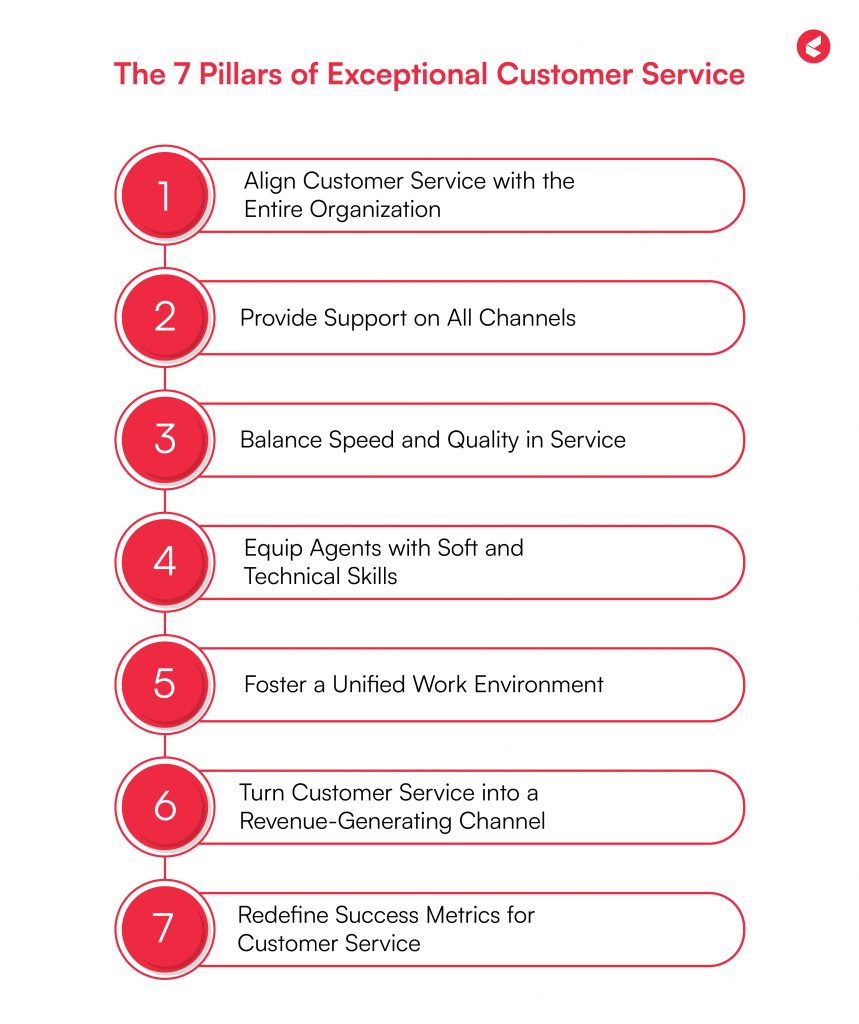
Mastering customer service requires blending technology and teamwork. By embracing these seven pillars, you can meet evolving customer needs and enhance loyalty that drives long-term success:
1. Align Customer Service with the Entire Organization
Customers expect effortless interactions, regardless of the department handling their concerns. Your CX platform should provide agents with a complete view of customer interactions and preferences. This helps them address concerns effectively without requiring customers to repeat information.
Additionally, cross-departmental collaboration ensures that complex issues get routed to the right team or specialist. When service teams sync with sales, marketing, and operations, the entire customer journey becomes smoother, reinforcing trust and brand loyalty. This holistic approach boosts overall satisfaction and retention rates.
2. Provide Support on All Channels
In this day and age, customers expect rapid responses and quality support through channels like telephone, email, messages, and social media. Offering omnichannel support ensures that you meet your customers where they feel most comfortable. It guarantees quick and efficient customer service, boosting satisfaction.
The CX platform will provide agents with all the necessary data, like order history or past interactions, at their fingertips no matter the channel type.
Integrating AI-powered chatbots assists with routine queries, while complex issues can be escalated to live agents. This omnichannel strategy ensures smooth support across all touchpoints.
3. Balance Speed and Quality in Service
Speed is important, but not at the cost of quality. Striking the right balance requires routing each query to the most qualified agent available and providing quick resolution without compromising service quality.
Omni-channel routing can be a valuable tool, directing cases based on skillsets and availability. Automation also streamlines processes, guiding agents through standardized workflows for common issues.
With these systems in place, customers experience faster and more tailored solutions based on their history and preferences. Ultimately, blending efficiency with quality leads to happier customers who receive the help they need quickly and effectively.
4. Equip Agents with Soft and Technical Skills
For successful customer service, your agents need a balance of interpersonal and technical skills. While knowing all your product details is essential, it is equally important to possess empathy, active listening and problem-solving skills.
Regular training in both areas prepares agents to handle complex queries while maintaining a friendly, helpful attitude. It is also essential to keep them updated on product knowledge, new technology, and evolving customer expectations.
Through continuous training and collaboration, agents can stay ahead, offering emotional support and technical guidance, and making customers feel understood and valued.
5. Foster a Unified Work Environment
While customer service agents work independently with clients, they still need strong team support to tackle tough cases. Encouraging open communication and collaboration, especially in remote teams, builds a sense of unity.
Regular team meetings and knowledge-sharing sessions help address complex cases faster and more effectively. Additionally, using techniques like case swarming, where multiple experts collaborate on solving tricky customer issues, improves problem-solving while training junior employees.
This team-based approach not only speeds up resolutions but also creates a culture of shared learning, where everyone can improve and offer better service.
6. Turn Customer Service into a Revenue-Generating Channel
Customer service is not just about troubleshooting; it can also boost your sales. When your agent rectifies a customer issue, they can use customer insights to cross-sell or upsell with a well-timed suggestion.
AI tools can offer tailored recommendations by analyzing customer data on past purchases and preferences. By seizing these opportunities, your customer service team can contribute directly to revenue growth while forging stronger customer relationships.
7. Redefine Success Metrics for Customer Service
Traditional metrics like handle time are useful but don’t tell the whole story. To truly measure customer service success, consider accurate metrics like customer satisfaction (CSAT), customer retention, and net promoter score (NPS).
These give a clear picture of how well your team is meeting customer needs and enhancing customer loyalty. You should also measure customer effort—how easy is it for customers to resolve their issues?
Reducing the effort required naturally improves satisfaction. By diversifying your metrics, you gain deeper insights into your team’s performance and how to improve the customer experience continually.
Traits of Good Customer Service
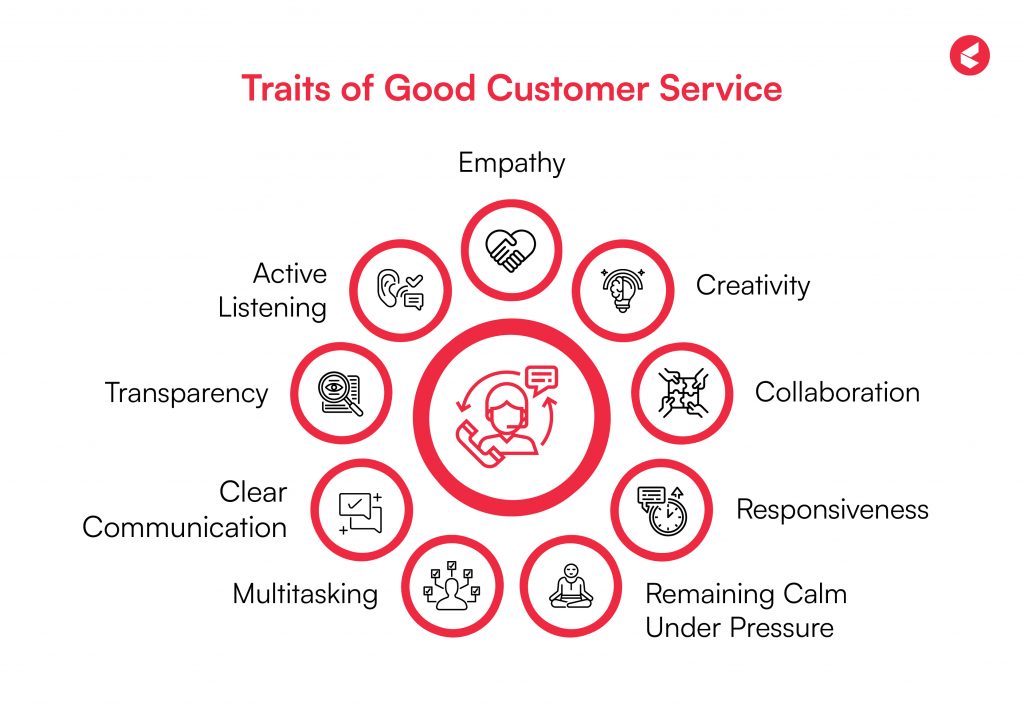
To ensure repeat business, customer service needs more than just a plan—it requires specific traits. These key qualities can transform ordinary service into extraordinary experiences:
1. Empathy
Empathy is key to understanding your customers’ feelings. By acknowledging their concerns and frustrations, you can create a personal connection. This not only calms situations but also builds trust.
Responding with phrases that resonate with your understanding of their frustration can make customers feel valued and heard, leading to better problem resolution.
For example, saying, “I get how annoying it is,” shows empathy. You could also use, “Let me look into that for you” to offer reassurance. These statements build trust and help defuse tense situations, leading to quicker and more positive outcomes.
2. Active Listening
A good listener fully understands the customer’s needs. Service reps must pay attention to spoken and unspoken cues like tone and body language. Comprehending the issue allows for more exact solutions, making the customers feel heard and respected.
3. Transparency
Always be clear and honest with customers, especially about wait times or service limitations. If the team is busy, provide accurate information to manage expectations, avoiding frustration.
Transparent solutions or explanations show customers that you value their time. For example, a callback system prevents long hold times and gives customers control over their interaction.
4. Clear Communication
Clear and concise communication is fundamental. Your ability to break down complex solutions into easily understandable terms can make all the difference. Great communicators provide accurate information without confusing jargon.
For example, instead of saying, “Our platform is cloud-based to ensure your data syncs across multiple servers,” try, “We’ll ensure all your data is safely backed up and quick to find.”
This ensures that customers understand their options and feel confident in the service you provide.
5. Multitasking
In live chat support, agents often juggle multiple conversations at once. Handling several inquiries without losing focus is key to ensuring that every customer receives timely attention.
Skilled multitaskers can effortlessly switch between tasks and resolve issues on one channel while responding to other customers on another. This makes sure no customer feels neglected, even during high-traffic periods.
6. Remaining Calm Under Pressure
Dealing with upset or angry customers can be stressful. Keeping one’s cool and bearing politeness, even when faced with pricking conditions, defines professionalism. Your calm demeanor reassures customers and helps de-escalate the conflict.
It often leads to more productive conversations. A collected response often turns a negative interaction into a positive resolution.
7. Responsiveness
Responding quickly shows customers that their time is valued. Even if a full solution cannot be provided right away, acknowledging their issue promptly eases their frustration. Whether through automated messages or personal emails, quick responses keep customers engaged and assured that their concerns are handled.
8. Collaboration
Sometimes, resolving a customer issue requires coordinating with other departments. Agents who collaborate effectively with colleagues find better solutions faster.
For example, working with technical support or billing teams ensures the customer gets a comprehensive solution without unnecessary back-and-forth.
9. Creativity
Not all customer service complaints are cut from the same cloth. Being creative helps you think outside the box to address unique problems.
Whether offering a tailored solution or improvising based on the situation, creativity empowers agents to deliver exceptional service, often exceeding customer expectations with innovative problem-solving.
For example, an agent could bundle a solution with an unexpected discount, delighting the customer while resolving their issue. This ensures that your brand is quick to get your customer’s attention for increased sales.
How to Deliver Great Customer Service?

Delivering excellent customer service involves utilizing various channels and following best practices that ensure customer satisfaction. Let’s explore the most effective ways to provide great service across different platforms.
1. Prioritize Customer Clarity
Always communicate clearly, using simple, non-technical language to explain solutions. Customers value easy-to-understand guidance, as it prevents confusion and frustration. Clear instructions reduce follow-up inquiries, ensuring faster resolution times and creating a smoother customer experience across all channels.
2. Leverage Automation Tools
Deploy AI Chatbots and automate workflows for routine questions so that agents are free to work on complex issues. Automation improves response time and helps customers receive instant answers.
This technology enhances efficiency and ensures 24/7 accessibility for faster problem-solving. It’s a great way to improve customer satisfaction without any manual intervention.
3. Implement Omnichannel Support
Provide uniform service across all channels: phone, email, chat, or social media. Through omnichannel support, customers can access your brand across their preferred medium without losing context. This ensures smooth channel switching and contributes to higher service quality, which in turn helps build brand loyalty.
4. Gather and Analyze Feedback
Regular customer feedback is essential for a better service strategy. Leverage data analytics to spot pain points, monitor satisfaction rates, and adapt using data-based decisions. Customer feedback provides valuable insight to businesses about what they can modify and improve to raise the bar of service quality.
5. Providing Self-Service Portals
From tracking orders to resolving common queries, self-service portals help customers find answers independently. Offer a well-designed self-service portal to increase customer autonomy and minimize response time, all while freeing up your agents to handle more complicated matters.
Customer Service Automation: A Strategic Advantage
Exceptional customer service is about creating positive and lasting experiences. As per Gartner, 80% of businesses will utilize generative AI technology by 2025 to improve customer experience and agent productivity.
Automation, powered by tools like AI-driven chatbots and self-service portals, allows businesses to provide 24/7 support for common queries.
For example, AI chatbots can resolve routine questions like order statuses or shipping inquiries almost instantly. However, complex and emotionally sensitive issues, such as billing disputes or service failures, often require human empathy and nuanced understanding.
A great example comes from a travel company where a customer needed to cancel their booking due to an emergency. While the AI chatbot quickly processed the cancellation, a human agent stepped in to provide a full refund and offer additional assistance.
This blend of automation and human input ensures that you meet customer needs efficiently while retaining the personal touch for more complex cases.
Wrapping Up!
Delivering exceptional customer service is key to achieving long-term business success. It’s not just an advantage; it’s essential for retaining customers and driving growth.
The right balance between automation and human interaction plays a pivotal role in ensuring high satisfaction. Automation allows for swift responses and scalability, while human agents provide the empathy needed for complex issues.
At Kapture, we help you deliver a seamless experience by equipping your agents with unified workspaces, advanced reporting tools, and streamlined communication channels. Exceed expectations, drive loyalty, and elevate your overall service quality with Kapture today!
Book a demo with us today!
FAQs
Automation improves efficiency, reduces costs, and enhances customer satisfaction by resolving routine inquiries quickly and accurately.
You can automate repetitive tasks while reserving complex or emotional issues for human agents to ensure personalized support.
Great customer service builds brand loyalty, increases customer retention, and encourages positive word-of-mouth marketing.
Kapture’s platform offers tools like omnichannel support, unified workspaces, AI integration, detailed analytics, and reporting features to streamline service and optimize performance.
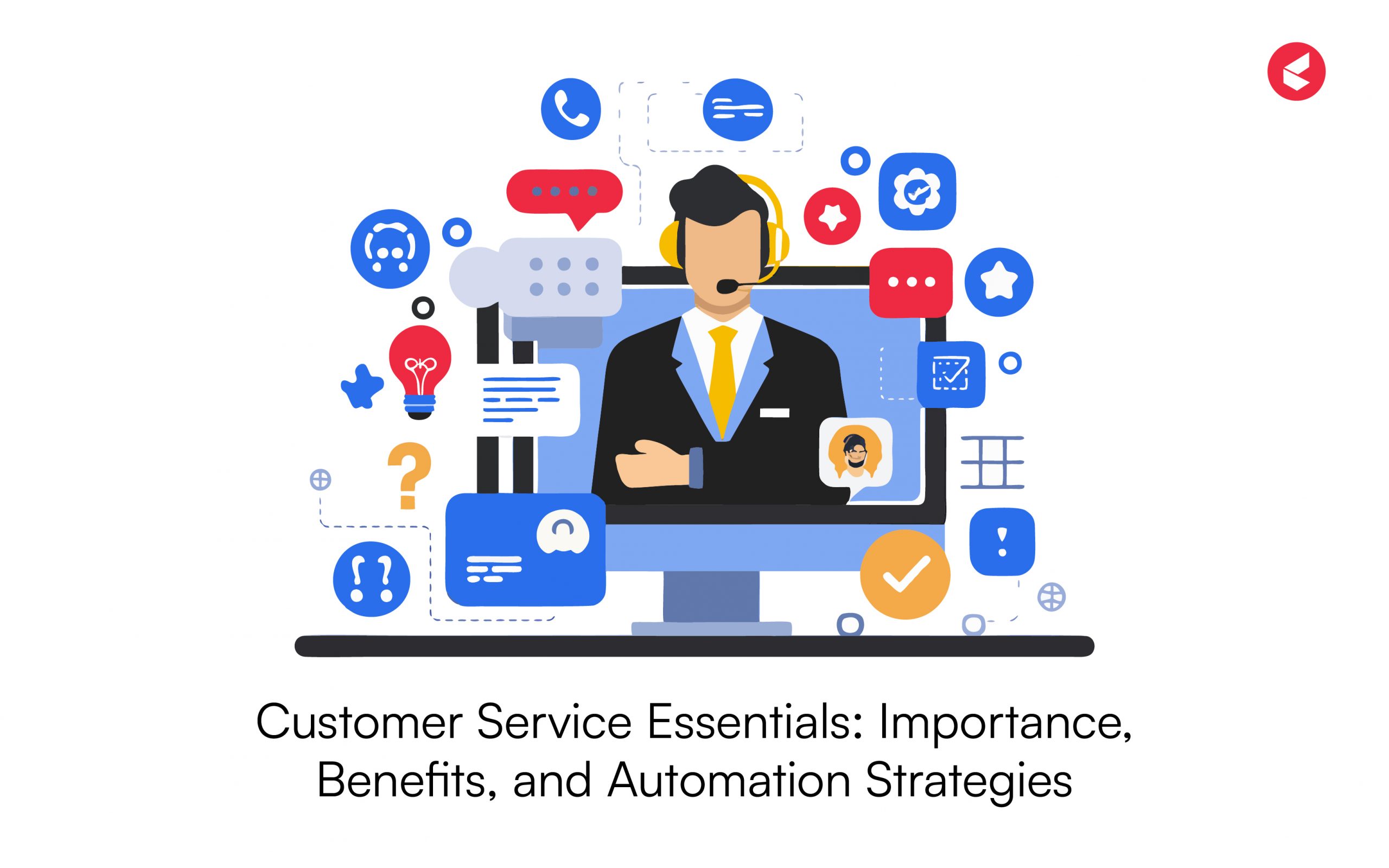


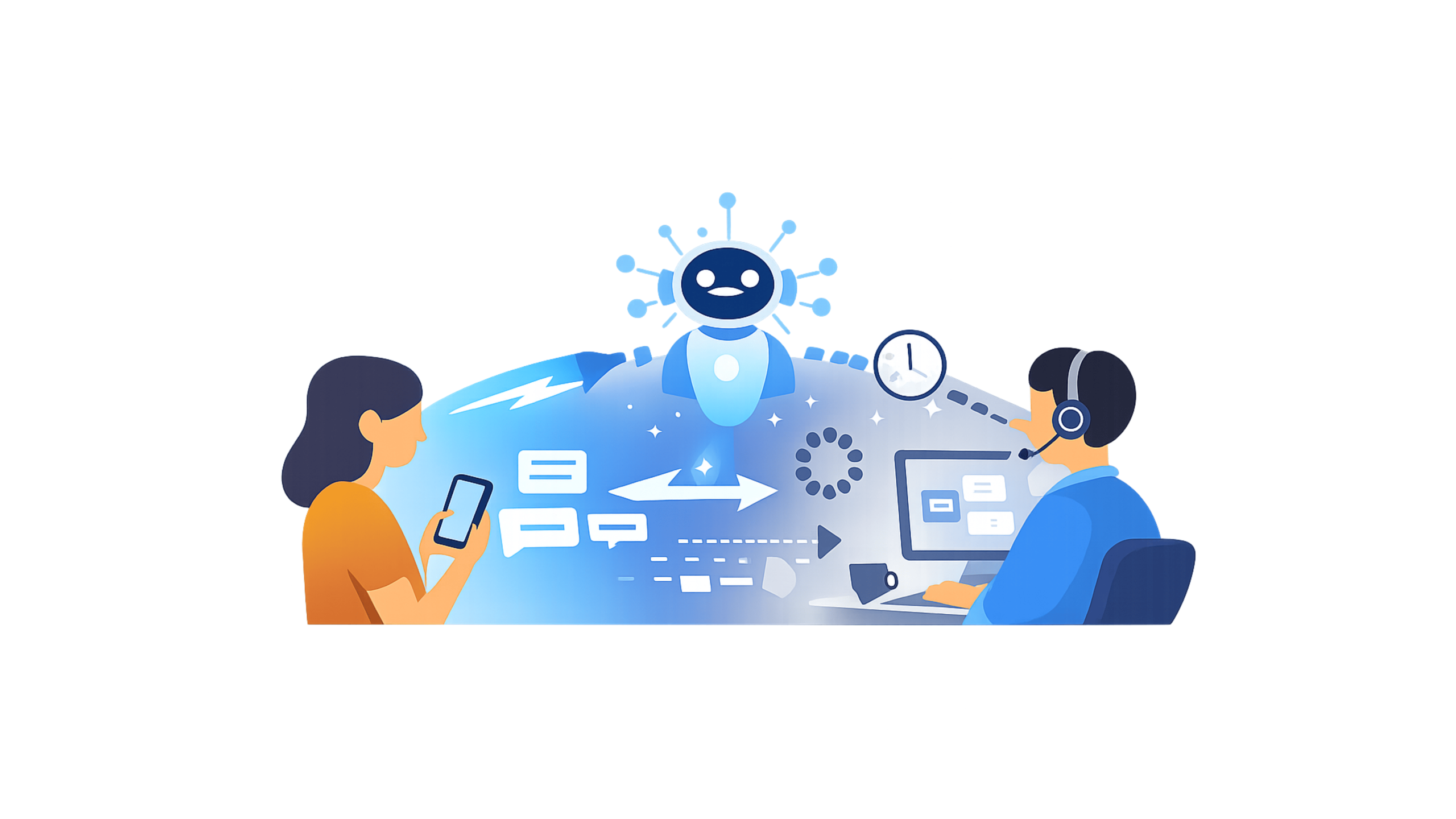
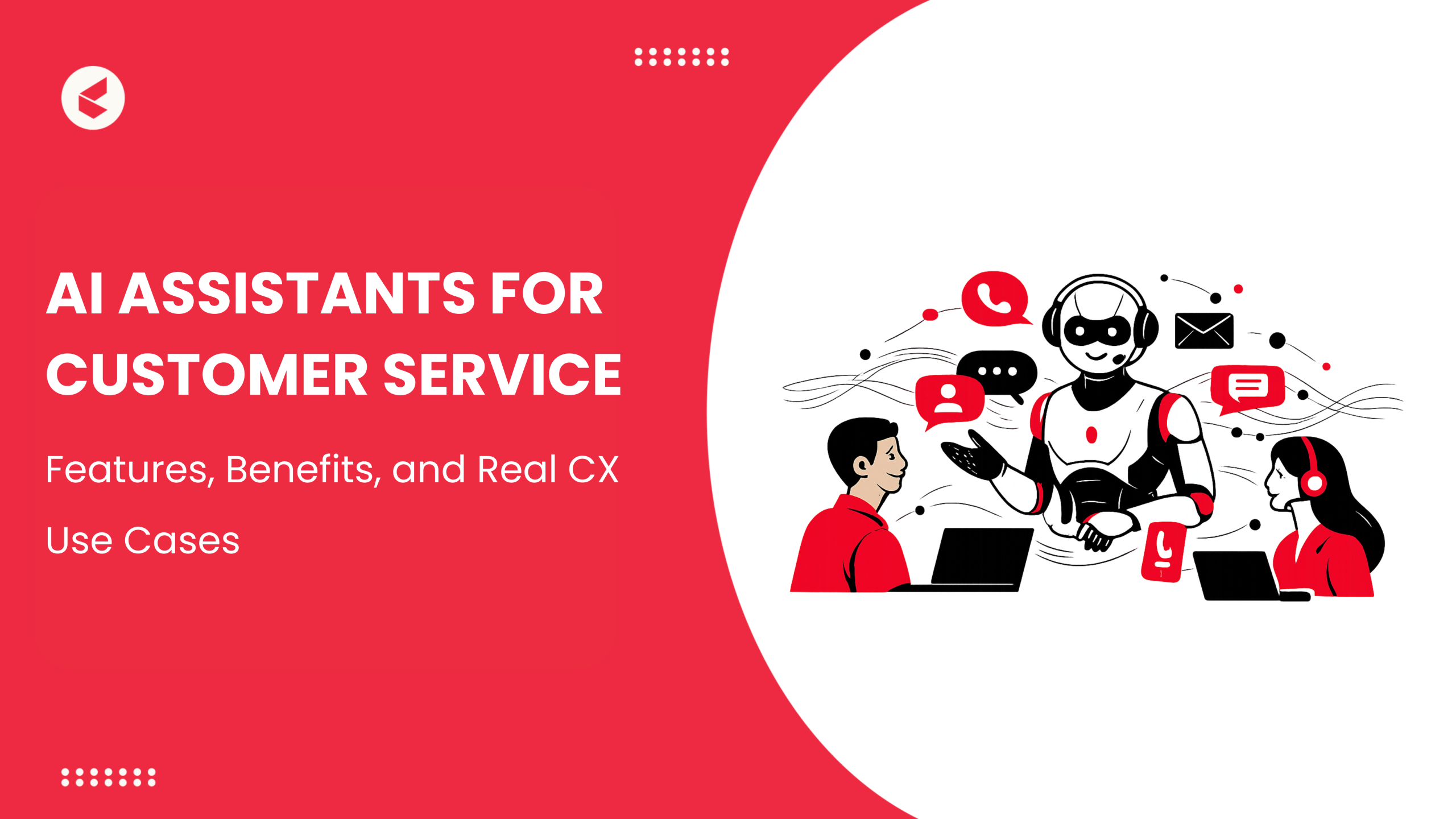









16 thoughts on “What is Customer Service? Importance, Benefits, and Automation Strategies”
Comments are closed.